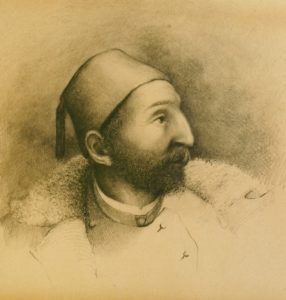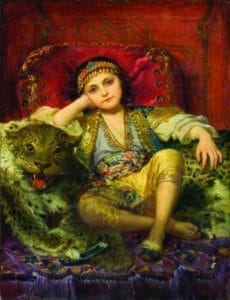“We may as well regard the curtain rung down on this act of my life. I have tried many things in the course of the dream – the law, soldiering, politics, authorship and, lastly, diplomacy – and if I may pass judgment upon the success achieved in each, it seems now that when I sit down finally in the old man’s gown and slippers, helping the cat to keep the fireplace warm, I shall look back upon Ben-Hur as my best performance, and this mission near the sultan as the next best…”

In 1881, President James Garfield appointed Lew Wallace minister to the Ottoman Empire. Garfield expressed the hope that Wallace would find inspiration in the Middle East to write a follow-up novel to Ben-Hur. After reaching Constantinople and settling in, Wallace went to the Sultan’s palace to present his credentials.
When the formalities were concluded, Wallace turned to the interpreter and requested to shake the Sultan’s hand. The interpreter and other courtiers were thunderstruck. The people of Turkey were not accustomed to shaking hands. For a foreigner—a Christian at that—to touch the Sultan was beyond comprehension. The interpreter refused to translate the request.
The Sultan became aware of Wallace’s displeasure and the interpreter’s discomfort and ultimately demanded an explanation. In great supplication and prostrate on the ground, the interpreter relayed the request. For a moment or two the Sultan considered Wallace and the request. Then he graciously extended his hand. In doing so, the Sultan put in motion the development of a relationship that was truly unique between the Emperor and the U.S. Minster.
Wallace became a trusted adviser to the Sultan. He brought a number of complex issues before the Sultan that were amicably addressed. Beyond these controversies that involved state decisions, Wallace also discussed advances in American agriculture and manufacturing that he felt would benefit the people under the Sultan’s rule.
Diplomatic Duties
As Minister, Wallace attended to many diplomatic and humanitarian issues in 1881 and 1882. He worked to free imprisoned Greek nationals. When the wrong Greeks were freed, Wallace worked successfully to obtain freedom for the original men. Throughout his appointment, his skills as a politician and diplomat were most often tested by Christian missionaries in need of support or protection.

He worked to negotiate a settlement between England and the Ottoman Empire in their fight over Egypt. Although his mediation was ultimately unsuccessful, he impressed both sides with his honest efforts. As a result of this negotiation Wallace’s title was elevated from minister resident to envoy extraordinary and minister plenipotentiary. This was the highest rank then available in the diplomatic service.
Travel in the Ottoman Empire
Even as he attended to official duties, Lew found time to do research and to travel throughout the Middle East. In 1883, Lew, Susan, and her sister Joanna Lane traveled to the Holy Land. They took a steamer to Jaffa and then traveled overland to Jerusalem. As Wallace toured the Holy Land checking locations against his descriptions in Ben-Hur, he felt his book was accurate. He said: “I found the descriptive details true to the existing objects and scenes, and I find no reason for making a single change in the text of the book.”
Wallace had worked to help Jewish refugees and he was welcomed in Jerusalem by rabbis who urged him further to encourage the Sultan to open Syrian ports to emigrants seeking to return to Palestine. Lew, Susan, and Joanna toured throughout Jerusalem and surrounding settlements. They then traveled to Suez, Alexandria, Cairo and other sites in Egypt. For the return to Constantinople, they sailed from Alexandria. Lew found a thirty-hour storm that lashed the ship majestic and sublime while Susan found it merely dreadful. They sailed to Athens and then on to Troy and back to Constantinople where Lew resumed his diplomatic work.
Gifts from the Sultan
As Lew’s tour of duty as envoy extraordinary and minister plenipotentiary to the Ottoman Empire came to an end in 1884, the Sultan offered a number of expensive gifts. As a representative of the government of the United States, Wallace graciously declined these expressions of friendship and gratitude. According to legend, as Wallace closed his office and packed his residence, the Sultan was able to secretly include the painting called The Turkish Princess, some elaborate carpets, and a few other items in the shipping crates. These items sent by the Sultan remained undiscovered by Wallace until he was back in Crawfordsville and opened the crates. The Turkish Princess, said to be one of the Sultan’s daughters, remains one of the highlights of the Study.